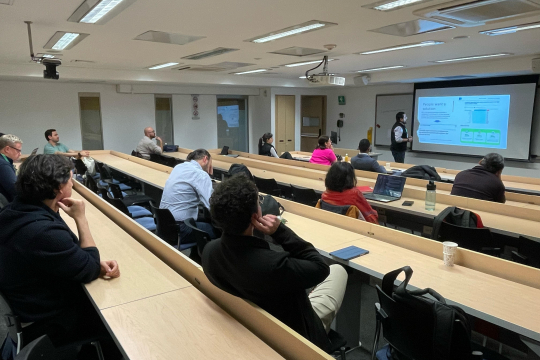More sustainable consumption patterns are crucial in addressing the environmental challenges faced by the Global South. EfD researchers play an essential role in exploring strategies and public attitudes toward these changes, focusing on how research can shape effective policies.
EfD Central America-Mexico participated in the First Congress of the Latin American Association of Environmental Economists and Natural Resources (LAERE), held in Bogotá, Colombia, from March 19 to 21. The event provided a platform for exchanging ideas and increasing the visibility of environmental economics and sustainable resource management.
SCOPE held a 2-day workshop
The event brought together a diverse range of experts to discuss key issues in environmental economics, including the impacts of climate change on agriculture, carbon taxation, water and energy policy, and payments for ecosystem services (PES), among other critical topics.
As part of the congress, the SCOPE Collaborative Program (Sustainable Consumption and Production) held a two-day workshop focused on sustainable consumption and production.
Changes in consumption must be driven by public support
“There is a significant lack of scientific evidence, especially in the Global South, regarding the public acceptance of substantial consumption changes as transition costs become more relevant,” said Pablo Evia, SCOPE coordinator, during his presentation on the progress of the research Attitudes towards adaptive changes in lifestyles.
“Data is essential to evaluate the feasibility of policies, understand public opinion, and foster transformative changes toward a sustainable future.”
This study is being developed in collaboration with Róger Madrigal (EfD-CAM Director), Niklas Harring, Åsa Löfgren, Frida Boräng, and Sverker Jagers (University of Gothenburg), Thong Q. Ho (EfD Vietnam), Shivani Wadehra (EfD India), and Francisco Alpizar (Wageningen University & Research). The research aims to understand public support for transformative changes in individual consumption patterns, particularly when they involve personal costs. It also explores how this support varies by socioeconomic group, gender, and geographic region.
The study builds on the premise that climate change, biodiversity loss, and pollution are driven by unsustainable production and consumption patterns. The Sustainable Development Goal (SDG) 12 aims to address these patterns to ensure long-term sustainability. However, achieving this goal requires understanding the individual and societal costs of these changes. Policymakers must collaborate with individuals to facilitate this shift toward sustainable lifestyles.
The congress paved the way for more collaborations
EfD-CAM’s participation in the LAERE Congress opened new opportunities to strengthen international collaborations in areas such as public policy design and sustainable consumption strategies, which are crucial for developing effective solutions to the environmental challenges of the Global South.
More information about the SCOPE Workshop can be found at: https://www.efdinitiative.org/news/strengthening-international-collaboration-sustainable-consumption-and-production-scope
By: Daniela Rivera
